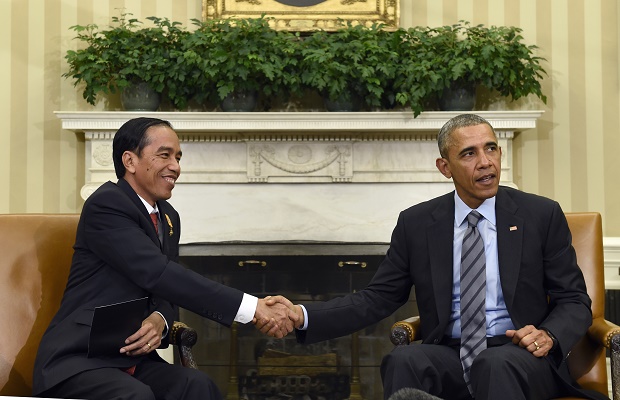Obama wins Indonesian backing for Pacific trade pact

President Barack Obama shake hands with Indonesian President Joko Widodo during their meeting in the Oval Office of the White House in Washington, Monday, Oct. 26, 2015. This is Widodo’s first visit to the U.S. since becoming President of Indonesia. AP Photo
WASHINGTON, United States—US President Barack Obama won Indonesia’s endorsement for a contentious trans-Pacific trade deal Monday, with the president of Southeast Asia’s largest economy vowing to join.
During a meeting with Obama at the White House, Joko Widodo risked the ire of economic nationalists at home and pledged to join the pact.
“Indonesia is an open economy and with a population of 250 million, we are the largest economy in Southeast Asia,” Widodo said in the Oval Office.
“Indonesia intends to join the TPP.”
Twelve countries are currently party to the “Trans-Pacific Partnership”—including Australia, Canada, Japan, Mexico, Vietnam and the United States—creating the world’s largest free trade area.
Article continues after this advertisementThe deal is seen by some as a counterbalance to growing Chinese economic clout in the region.
Article continues after this advertisementWidodo’s endorsement is a political victory for Obama, who is steering the already completed pact through a hostile Republican-controlled Congress and without the full backing of his Democratic party.
Hillary Clinton, the 2016 election frontrunner, has said the deal falls short of the “high bar” she had set for helping US interests.
Obama has claimed the TPP has the strongest labor and environmental standards of any trade deal signed by the United States.
Widodo comments will also raise hopes that he will help catalyze the world’s most populous Muslim nation, allowing Indonesia to finally punch its weight.
Sketching out a “key strategic partnership” Obama—who lived in Indonesia for nearly five years as a child—said the US needed good relations with Jakarta.
“Obviously I have a very personal interest in Indonesia, given the fact that I spent a bit of time there as a child and have relatives who are Indonesian,” Obama said.
“But what is also true is that our partnership is very much in the interests of the United States, given Indonesia’s large population, its leadership in the region, its democratic traditions, the fact that it is a large Muslim country with a tradition of tolerance and moderation, and its role in trade and commerce and economic development.”
Widodo’s visit to the White House was the first by an Indonesian president in a decade and came exactly a year after the former furniture salesman became president.
In surviving even that long, he has defied skeptics who predicted he would quickly flounder in the oligarch-infested waters of Indonesian politics.
Obama endorsement
In the Oval Office, Obama offered his own endorsement, praising the economic reform efforts of a fellow 54-year-old who, like him, swept to power as an outsider promising change.
Indonesia’s notoriously protectionist economy has been stymied by systemic corruption, lower commodity prices and China’s economic slowdown.
Unemployment among the vast ranks of Indonesia’s youth stands at more than 20 percent, and efforts to attract investors have been undercut by economic nationalism, vested interests and red tape.
In Washington, Widodo met with executives from several US firms, including GE, Caterpillar and Coca-Cola, to finalize 12 investment deals worth a total of $20.25 billion to improve Indonesian infrastructure.
“Now is the time to invest: Indonesia is open for business,” Widodo said in a statement released by his embassy.
But Widodo’s efforts to win further US investment suffered a blow when he was forced to cancel a swing to America’s West Coast and meetings with fund managers and Silicon Valley executives, including from Google and Apple’s Tim Cook.
Widodo spokesman Ari Dwipayana said the president was leaving to help deal with clouds of smoke that have blanketed large areas of his country.
Thousands of fires caused by slash-and-burn agriculture in Indonesia’s forests have forced schools and offices to close and airlines to cancel flights.
RELATED STORIES
Pacific trade agreement could cause rift in political camps